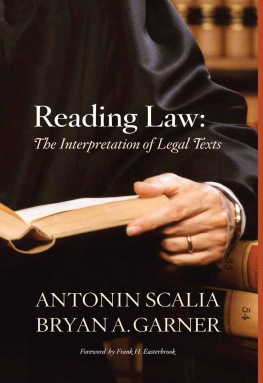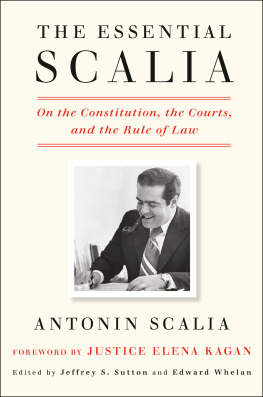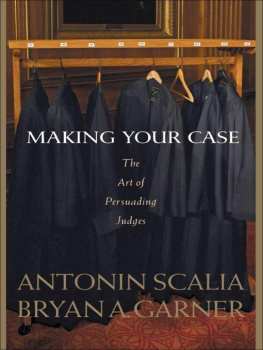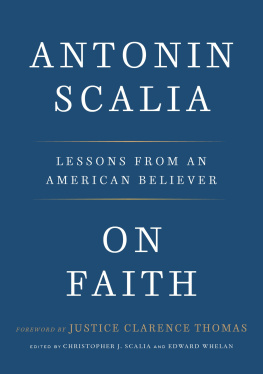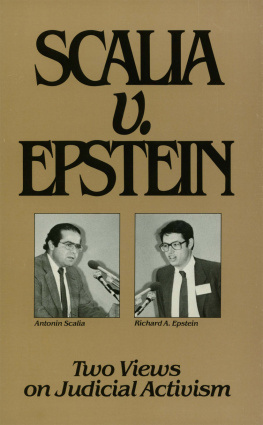Full-Length Table of Contents
Reading Law
Reading Law
The Interpretation
of Legal Texts
Antonin Scalia & Bryan A. Garner
The views expressed in this book are those of the authors as legal commentators. Nothing in this book prejudges any case that might come before the United States Supreme Court.
2012 Antonin Scalia & Bryan A. Garner
Published by Thomson/West
610 Opperman Drive
P.O. Box 64526
St. Paul, MN 55164-0527
1-800-328-9352
ISBN: 978-0-314-27555-4
Printed in the United States of America
Library of Congress Cataloguing-in-Publication Data
Antonin Scalia & Bryan A. Garner
Reading Law: the interpretation of legal texts 1st ed.
p. cm.
Includes bibliographical references and index.
1. Lawinterpretation and construction.
2. Judicial ProcessUnited States.
3. Lawphilosophy.
4. StatutesUnited States.
5. Jurisprudence.
6. Lawmethodology.
I. Scalia, Antonin, 1936
I. Garner, Bryan A., 1958
II. Title
First printing
Verbis legis tenaciter inhaerendum .
Medieval legal maxim meaning
Hold tight to the words of the law.
[L]aw, without equity, though hard and disagreeable, is much more desirable for the public good, than equity without law: which would make every judge a legislator, and introduce most infinite confusion.
William Blackstone
1 Commentaries on the Laws of England 62
(4th ed. 1770).
Various and discordant readings, glosses, and commentaries will inevitably arise in the progress of time, and, perhaps, as often from the want of skill and talent in those who comment, as in those who make the law.
James Kent
1 Commentaries on American Law 437 (1826).
[J]udges must be aware today that there are currents of ferment in the legal world that seek to revise or even overthrow traditional notions of judicial interpretation.
William H. Rehnquist
The Nature of Judicial Interpretation,
in Politics and the Constitution:
The Nature and Extent of Interpretation 3, 3 (1990).
What is of paramount importance is that Congress be able to legislate against a background of clear interpretive rules, so that it may know the effect of the language it adopts.
Finley v. United States ,
490 U.S. 545, 556 (1989) (per Scalia, J.).
To Maureen McCarthy Scalia
and
Karolyne H.C. Garner
Acknowledgments
We are grateful to our many learned friends who contributed in myriad ways, from suggesting interesting problems, to advising on particular points, to reading and commenting on the manuscript. We are especially indebted to the following friends who commented critically and copiously on the manuscript:

Along the way, we have benefited from the logistical help and the perceptive suggestions of these scholars, lawyers, and judges: Edwin Anderson, Hans W. Baade, Rachel E. Barkow, Michael Boudin, Brian D. Boyle, Daniel A. Bress, Richard P. Bress, Steven G. Calabresi, Andrew Christensen, Gail Daly, Susan E. Engel, Louis Feldman, Noel J. Francisco, W. Royal Furgeson Jr., Curtis E. Gannon, Neil C. Gosch, Nathan L. Hecht, C. Scott Hemphill, Gregory Ivy, Kumar Percy Jayasuriya, Christine Jolls, Daniel R. Karon, Brett Kavanaugh, Gary S. Lawson, Lawrence Lessig, Victoria A. Lowery, Scott Martin, Stephen A. Miller, Gary Muldoon, David Nahmias, Regina L. Nassen, Andrew J. Nussbaum, John C. OQuinn, Lee Liberman Otis, G.P. Pagone, Vince Parrett, John Phillips, William H. Pryor Jr., Michael D. Ramsey, Jane Richards Roth, D. John Sauer, Patrick J. Schiltz, Gil Seinfeld, Kannon K. Shanmugam, Donna F. Solen, John R. Trimble, and Henry Weissman.
At LawProse, Inc. in Dallas, we had the benefit not only of a fine law library but also of several accomplished legal researchers: Tiger Jackson, Jeff Newman, Becky R. McDaniel, Heather C. Haines, Timothy D. Martin, and Eliot Turner. Other LawProse staffers who contributed were Ryden McComas Anderson, Scott Keffer, and Melissa Foster Sanz.
The Garner Law Scholars at the Southern Methodist University Dedman School of Law briefed dozens of cases for our consideration. They were Salman Bhojani, Gregory A. Brassfield, Levi M. Dillon, Andrew J.M. Johnson, Carrie Xuan Nie, Abel Ramirez Jr., Derric Smith, Ben A. West, and Kimberly Winnubst. Bryan Garner in particular thanks Dean John Attanasio for creating the Garner Law Scholar program. Dean Attanasio also provided the resources to amass over 1,500 scholarly articles on statutory interpretation. Gregory Ivy at the SMU Underwood Law Library oversaw the compiling of the articles by Brandon Michael Duck, David Thomas Khirallah, Lauren Elizabeth Maluso, Daniel Osterland, and Ryan Christopher Storey. We thank Daniel P. Rosati and William S. Hein & Co. for permitting use of the HeinOnline database, which was necessary for this ambitious endeavor.
Both Karen Magnuson of Portland and Shmuel Gerber of New York copyedited the manuscript with great skill and insight. We are grateful.
Among our predecessors in this vineyard, we especially express gratitude to Henry Campbell Black, Max Radin, and Frederick J. de Sloovre for their incomparably helpful work.
A.S.B.A.G.
Foreword
Frank H. Easterbrook
[S]trict construction... is not a doctrine to be taken seriously (p. 356). Many people will be surprised to read this line, which is elaborated in an entire chapter ( 62) of a book by two textualists who think that statutory language is both the start and the finish of the interpretive process. But no one who has paid close attention to how textualists decide cases (on the bench) or explain their methods (on or off the bench) should be surprised. Some texts proclaim that they should be read strictly (i.e., narrowly); others demand a broad or general application. The texts author, not the interpreter, gets to choose how the language will be understood and applied. The courts job is to carry out the legislative project, not to change it in conformity with the judges view of sound policy.
Those who favor a more open-ended judicial role often quote a passage from Chief Justice John Marshall, who is usually accounted the greatest of our Justicesand whose status as a member of the founding generation (he participated in Virginias ratifying convention) gives him a claim to represent the original understanding about interpretive method. Chief Justice Marshall once wrote: Where the mind labours to discover the design of the legislature, it seizes every thing from which aid can be derived. This passage has been used to argue for resort to legislative history, the (imputed) intent of the legislators, and a dominant role for the judges sense of whether a given reading produces good consequences (if a judge can determine what the consequences will be, often a hard task even for social scientists who can draw on data unavailable to a court making a prediction).
Thats not remotely what Chief Justice Marshall meant, however. Here is the full sentence: Where the mind labours to discover the design of the legislature, it seizes every thing from which aid can be derived; and in such case the title claims a degree of notice, and will have its due share of consideration. He was advocating, not a departure from statutory text, or a role for extra-statutory materials, but consideration of all the enacted text rather than a subset of it. This book takes the same position ( 24). It is brimming with quotations from Chief Justice Marshall, all of which support a textualist approach to interpretation.
What Chief Justice Marshall knewwhat this book develops is that the more the interpretive process strays outside a laws text, the greater the interpreters discretion. Extra materials are bound to look in multiple directions. Legislators talk (whether on the floor or in a committee report) is not as precise as statutory language, and it is not adopted by the process for creating laws (bicameral approval plus signature by the chief executive). Legislative intent is a fiction, a back-formation from other and often undisclosed sources. Every legislat or has an intent, which usually cannot be discovered, since most say nothing before voting on most bills; and the legislat ure is a collective body that does not have a mind; it intends only that the text be adopted, and statutory texts usually are compromises that match no ones first preference.
Next page
